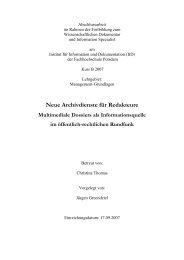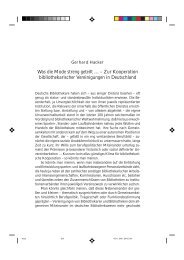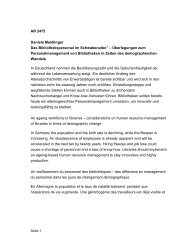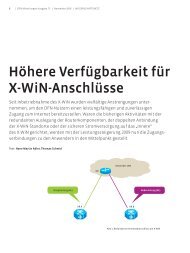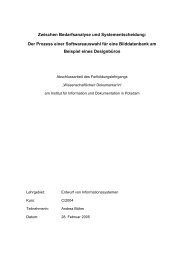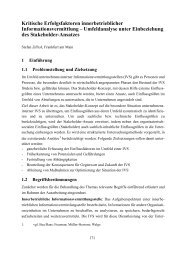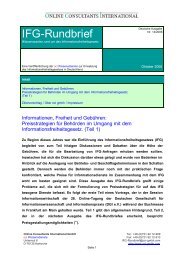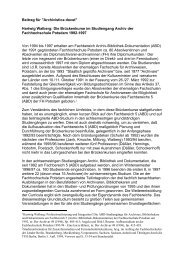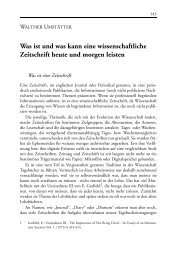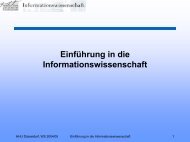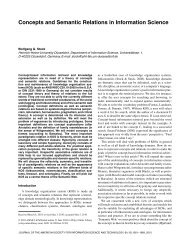- Seite 1 und 2: Griesbaum, Mandl, Womser-Hacker (Hr
- Seite 3 und 4: Joachim Griesbaum, Thomas Mandl, Ch
- Seite 5 und 6: Inhaltsverzeichnis Veranstalter & T
- Seite 7 und 8: Session 6: Multimedia 221 Peter Sch
- Seite 9 und 10: Session 11: E-Learning / Social Med
- Seite 11 und 12: Veranstalter & Tagungsteam Hochschu
- Seite 13 und 14: Programmkomitee Internationales Sym
- Seite 15 und 16: When Music comes into Play - Überl
- Seite 17 und 18: Vorwort 17 Vorwort Das 12. Internat
- Seite 19: Vorwort 19 Abstracts der Keynotes
- Seite 23 und 24: Information Retrieval: Technology,
- Seite 25 und 26: Predicting user preferences 25 case
- Seite 27 und 28: Predicting user preferences 27 othe
- Seite 29 und 30: Predicting user preferences 29 Firs
- Seite 31 und 32: Predicting user preferences 31 Figu
- Seite 33 und 34: Predicting user preferences 33 leas
- Seite 35 und 36: Predicting user preferences 35 Jär
- Seite 37 und 38: Usefulness Evaluation on Visualizat
- Seite 39 und 40: Usefulness Evaluation on Visualizat
- Seite 41 und 42: Usefulness Evaluation on Visualizat
- Seite 43 und 44: Usefulness Evaluation on Visualizat
- Seite 45 und 46: Usefulness Evaluation on Visualizat
- Seite 47 und 48: Vergleich von IR-Systemkonfiguratio
- Seite 49 und 50: Vergleich von IR-Systemkonfiguratio
- Seite 51 und 52: Vergleich von IR-Systemkonfiguratio
- Seite 53 und 54: Vergleich von IR-Systemkonfiguratio
- Seite 55 und 56: Vergleich von IR-Systemkonfiguratio
- Seite 57 und 58: Vergleich von IR-Systemkonfiguratio
- Seite 59 und 60: Vergleich von IR-Systemkonfiguratio
- Seite 61 und 62: Vergleich von IR-Systemkonfiguratio
- Seite 63 und 64: Komponenten-basierte Metadatenschem
- Seite 65 und 66: Komponenten-basierte Metadatenschem
- Seite 67 und 68: Komponenten-basierte Metadatenschem
- Seite 69 und 70: Komponenten-basierte Metadatenschem
- Seite 71 und 72:
Komponenten-basierte Metadatenschem
- Seite 73 und 74:
Komponenten-basierte Metadatenschem
- Seite 75 und 76:
Toolbasierte Datendokumentation in
- Seite 77 und 78:
Toolbasierte Datendokumentation in
- Seite 79 und 80:
Toolbasierte Datendokumentation in
- Seite 81 und 82:
Toolbasierte Datendokumentation in
- Seite 83 und 84:
Toolbasierte Datendokumentation in
- Seite 85 und 86:
Nachhaltige Dokumentation virtuelle
- Seite 87 und 88:
Nachhaltige Dokumentation virtuelle
- Seite 89 und 90:
Nachhaltige Dokumentation virtuelle
- Seite 91 und 92:
Nachhaltige Dokumentation virtuelle
- Seite 93 und 94:
Nachhaltige Dokumentation virtuelle
- Seite 95 und 96:
Nachhaltige Dokumentation virtuelle
- Seite 97 und 98:
Nachhaltige Dokumentation virtuelle
- Seite 99 und 100:
Konferenz-Tweets 99 Weise entsteht
- Seite 101 und 102:
Konferenz-Tweets 101 Tabelle 1: Üb
- Seite 103 und 104:
Konferenz-Tweets 103 Konferenz bezi
- Seite 105 und 106:
Konferenz-Tweets 105 sentliche Frag
- Seite 107 und 108:
Konferenz-Tweets 107 Eine intensive
- Seite 109 und 110:
Konferenz-Tweets 109 4 Fazit und Au
- Seite 111 und 112:
Social Bookmarking als Werkzeug fü
- Seite 113 und 114:
Social Bookmarking als Werkzeug fü
- Seite 115 und 116:
Social Bookmarking als Werkzeug fü
- Seite 117 und 118:
Social Bookmarking als Werkzeug fü
- Seite 119 und 120:
Social Bookmarking als Werkzeug fü
- Seite 121 und 122:
Social Bookmarking als Werkzeug fü
- Seite 123 und 124:
T-Index als Stabilitätsindikator f
- Seite 125 und 126:
T-Index als Stabilitätsindikator f
- Seite 127 und 128:
T-Index als Stabilitätsindikator f
- Seite 129 und 130:
T-Index als Stabilitätsindikator f
- Seite 131 und 132:
T-Index als Stabilitätsindikator f
- Seite 133 und 134:
T-Index als Stabilitätsindikator f
- Seite 135 und 136:
T-Index als Stabilitätsindikator f
- Seite 137 und 138:
A data model for cross-domain data
- Seite 139 und 140:
A data model for cross-domain data
- Seite 141 und 142:
A data model for cross-domain data
- Seite 143 und 144:
A data model for cross-domain data
- Seite 145 und 146:
A data model for cross-domain data
- Seite 147 und 148:
A data model for cross-domain data
- Seite 149 und 150:
Wissenschaftliche Zeitschriften im
- Seite 151 und 152:
Wissenschaftliche Zeitschriften im
- Seite 153 und 154:
Wissenschaftliche Zeitschriften im
- Seite 155 und 156:
Wissenschaftliche Zeitschriften im
- Seite 157 und 158:
Wissenschaftliche Zeitschriften im
- Seite 159 und 160:
Wissenschaftliche Zeitschriften im
- Seite 161 und 162:
Abdeckung erziehungswissenschaftlic
- Seite 163 und 164:
Abdeckung erziehungswissenschaftlic
- Seite 165 und 166:
Abdeckung erziehungswissenschaftlic
- Seite 167 und 168:
Abdeckung erziehungswissenschaftlic
- Seite 169 und 170:
Abdeckung erziehungswissenschaftlic
- Seite 171 und 172:
Abdeckung erziehungswissenschaftlic
- Seite 173 und 174:
Constructing Topic-specific Search
- Seite 175 und 176:
Constructing Topic-specific Search
- Seite 177 und 178:
Constructing Topic-specific Search
- Seite 179 und 180:
Constructing Topic-specific Search
- Seite 181 und 182:
Constructing Topic-specific Search
- Seite 183 und 184:
Constructing Topic-specific Search
- Seite 185 und 186:
Applying Science Models for Search
- Seite 187 und 188:
Applying Science Models for Search
- Seite 189 und 190:
Applying Science Models for Search
- Seite 191 und 192:
Applying Science Models for Search
- Seite 193 und 194:
Applying Science Models for Search
- Seite 195 und 196:
Applying Science Models for Search
- Seite 197 und 198:
Spezielle Anforderungen bei d. Eval
- Seite 199 und 200:
Spezielle Anforderungen bei d. Eval
- Seite 201 und 202:
Spezielle Anforderungen bei d. Eval
- Seite 203 und 204:
Spezielle Anforderungen bei d. Eval
- Seite 205 und 206:
Spezielle Anforderungen bei d. Eval
- Seite 207 und 208:
Spezielle Anforderungen bei d. Eval
- Seite 209 und 210:
Entwicklung einer Benutzeroberfläc
- Seite 211 und 212:
Entwicklung einer Benutzeroberfläc
- Seite 213 und 214:
Entwicklung einer Benutzeroberfläc
- Seite 215 und 216:
Entwicklung einer Benutzeroberfläc
- Seite 217 und 218:
Entwicklung einer Benutzeroberfläc
- Seite 219 und 220:
Entwicklung einer Benutzeroberfläc
- Seite 221 und 222:
Entwicklung einer Benutzeroberfläc
- Seite 223 und 224:
Effects of real, media and presenta
- Seite 225 und 226:
Effects of real, media and presenta
- Seite 227 und 228:
Effects of real, media and presenta
- Seite 229 und 230:
Effects of real, media and presenta
- Seite 231 und 232:
Effects of real, media and presenta
- Seite 233 und 234:
Effects of real, media and presenta
- Seite 235 und 236:
Ein erweiterbares Tool zur Annotati
- Seite 237 und 238:
Ein erweiterbares Tool zur Annotati
- Seite 239 und 240:
Ein erweiterbares Tool zur Annotati
- Seite 241 und 242:
Ein erweiterbares Tool zur Annotati
- Seite 243 und 244:
Ein erweiterbares Tool zur Annotati
- Seite 245 und 246:
Ein erweiterbares Tool zur Annotati
- Seite 247 und 248:
AV-Portal für wissenschaftliche Fi
- Seite 249 und 250:
AV-Portal für wissenschaftliche Fi
- Seite 251 und 252:
AV-Portal für wissenschaftliche Fi
- Seite 253 und 254:
AV-Portal für wissenschaftliche Fi
- Seite 255 und 256:
AV-Portal für wissenschaftliche Fi
- Seite 257 und 258:
Significant properties digitaler Ob
- Seite 259 und 260:
Significant properties digitaler Ob
- Seite 261 und 262:
Significant properties digitaler Ob
- Seite 263 und 264:
Significant properties digitaler Ob
- Seite 265 und 266:
Significant properties digitaler Ob
- Seite 267 und 268:
Significant properties digitaler Ob
- Seite 269 und 270:
Significant properties digitaler Ob
- Seite 271 und 272:
A survey of internet searching skil
- Seite 273 und 274:
A survey of internet searching skil
- Seite 275 und 276:
A survey of internet searching skil
- Seite 277 und 278:
A survey of internet searching skil
- Seite 279 und 280:
A survey of internet searching skil
- Seite 281 und 282:
A survey of internet searching skil
- Seite 283 und 284:
A survey of internet searching skil
- Seite 285 und 286:
A survey of internet searching skil
- Seite 287 und 288:
Kontextspezifische Erhebung von auf
- Seite 289 und 290:
Kontextspezifische Erhebung von auf
- Seite 291 und 292:
Kontextspezifische Erhebung von auf
- Seite 293 und 294:
Kontextspezifische Erhebung von auf
- Seite 295 und 296:
Kontextspezifische Erhebung von auf
- Seite 297 und 298:
Kontextspezifische Erhebung von auf
- Seite 299 und 300:
Evaluation von Summarizing-Systemen
- Seite 301 und 302:
Evaluation von Summarizing-Systemen
- Seite 303 und 304:
Evaluation von Summarizing-Systemen
- Seite 305 und 306:
Evaluation von Summarizing-Systemen
- Seite 307 und 308:
Evaluation von Summarizing-Systemen
- Seite 309 und 310:
Bedarf an Informationsspezialisten
- Seite 311 und 312:
Bedarf an Informationsspezialisten
- Seite 313 und 314:
Bedarf an Informationsspezialisten
- Seite 315 und 316:
Bedarf an Informationsspezialisten
- Seite 317 und 318:
Bedarf an Informationsspezialisten
- Seite 319 und 320:
Bedarf an Informationsspezialisten
- Seite 321 und 322:
Bedarf an Informationsspezialisten
- Seite 323 und 324:
Mining qualitative data on human in
- Seite 325 und 326:
Mining qualitative data on human in
- Seite 327 und 328:
The Social Persona Approach 327 Abs
- Seite 329 und 330:
The Social Persona Approach 329 The
- Seite 331 und 332:
The Social Persona Approach 331 Fig
- Seite 333 und 334:
„Mobile Tagging“: Konzeption un
- Seite 335 und 336:
„Mobile Tagging“: Konzeption un
- Seite 337 und 338:
„Mobile Tagging“: Konzeption un
- Seite 339 und 340:
„Mobile Tagging“: Konzeption un
- Seite 341 und 342:
„Mobile Tagging“: Konzeption un
- Seite 343 und 344:
„Mobile Tagging“: Konzeption un
- Seite 345 und 346:
User Interface Prototyping 345 User
- Seite 347 und 348:
User Interface Prototyping 347 tige
- Seite 349 und 350:
User Interface Prototyping 349 Deta
- Seite 351 und 352:
User Interface Prototyping 351 Tabe
- Seite 353 und 354:
User Interface Prototyping 353 Tabe
- Seite 355 und 356:
User Interface Prototyping 355 Ausb
- Seite 357 und 358:
Analyse und Evaluierung der Nutzung
- Seite 359 und 360:
Analyse und Evaluierung der Nutzung
- Seite 361 und 362:
Analyse und Evaluierung der Nutzung
- Seite 363 und 364:
Analyse und Evaluierung der Nutzung
- Seite 365 und 366:
Analyse und Evaluierung der Nutzung
- Seite 367 und 368:
Analyse und Evaluierung der Nutzung
- Seite 369 und 370:
Online-Beratungsk. für die Auswahl
- Seite 371 und 372:
Online-Beratungsk. für die Auswahl
- Seite 373 und 374:
Online-Beratungsk. für die Auswahl
- Seite 375 und 376:
Online-Beratungsk. für die Auswahl
- Seite 377 und 378:
Use, but verify 377 information abo
- Seite 379 und 380:
Use, but verify 379 their fruits ye
- Seite 381 und 382:
Problems and prospects of implement
- Seite 383 und 384:
Problems and prospects of implement
- Seite 385 und 386:
Problems and prospects of implement
- Seite 387 und 388:
Problems and prospects of implement
- Seite 389 und 390:
Domänenübergreifende Phrasenextra
- Seite 391 und 392:
Domänenübergreifende Phrasenextra
- Seite 393 und 394:
Content Analysis in der Mathematik:
- Seite 395 und 396:
Content Analysis in der Mathematik:
- Seite 397 und 398:
Content Analysis in der Mathematik:
- Seite 399 und 400:
Content Analysis in der Mathematik:
- Seite 401 und 402:
Content Analysis in der Mathematik:
- Seite 403 und 404:
Content Analysis in der Mathematik:
- Seite 405 und 406:
Das Konzept der Informativität 405
- Seite 407 und 408:
Das Konzept der Informativität 407
- Seite 409 und 410:
Das Konzept der Informativität 409
- Seite 411 und 412:
Identification Systems Adoption in
- Seite 413 und 414:
Identification Systems Adoption in
- Seite 415 und 416:
Identification Systems Adoption in
- Seite 417 und 418:
Identification Systems Adoption in
- Seite 419 und 420:
Identification Systems Adoption in
- Seite 421 und 422:
Identification Systems Adoption in
- Seite 423 und 424:
Virtuelle Forschungsumgebungen 423
- Seite 425 und 426:
Virtuelle Forschungsumgebungen 425
- Seite 427 und 428:
Virtuelle Forschungsumgebungen 427
- Seite 429 und 430:
Virtuelle Forschungsumgebungen 429
- Seite 431 und 432:
Virtuelle Forschungsumgebungen 431
- Seite 433 und 434:
Virtuelle Forschungsumgebungen 433
- Seite 435 und 436:
Der Streit um die Regelung des Zwei
- Seite 437 und 438:
Der Streit um die Regelung des Zwei
- Seite 439 und 440:
Der Streit um die Regelung des Zwei
- Seite 441 und 442:
Der Streit um die Regelung des Zwei
- Seite 443 und 444:
Der Streit um die Regelung des Zwei
- Seite 445 und 446:
Der Streit um die Regelung des Zwei
- Seite 447 und 448:
Der Streit um die Regelung des Zwei
- Seite 449 und 450:
Der Streit um die Regelung des Zwei
- Seite 451 und 452:
Der Streit um die Regelung des Zwei
- Seite 453 und 454:
Der Streit um die Regelung des Zwei
- Seite 455 und 456:
Integrating industrial partners int
- Seite 457 und 458:
Integrating industrial partners int
- Seite 459 und 460:
Integrating industrial partners int
- Seite 461 und 462:
Integrating industrial partners int
- Seite 463 und 464:
Integrating industrial partners int
- Seite 465 und 466:
Integrating industrial partners int
- Seite 467 und 468:
E-Learningkurs Globalisierung 467 E
- Seite 469 und 470:
E-Learningkurs Globalisierung 469 B
- Seite 471 und 472:
E-Learningkurs Globalisierung 471 f
- Seite 473 und 474:
E-Learningkurs Globalisierung 473 b
- Seite 475 und 476:
E-Learningkurs Globalisierung 475 A
- Seite 477 und 478:
E-Learningkurs Globalisierung 477 N
- Seite 479 und 480:
Social-Media-Marketing im Hochschul
- Seite 481 und 482:
Social-Media-Marketing im Hochschul
- Seite 483 und 484:
Social-Media-Marketing im Hochschul
- Seite 485 und 486:
Social-Media-Marketing im Hochschul
- Seite 487 und 488:
Social-Media-Marketing im Hochschul
- Seite 489 und 490:
Social-Media-Marketing im Hochschul
- Seite 491 und 492:
Social-Media-Marketing im Hochschul
- Seite 493 und 494:
Social-Media-Marketing im Hochschul
- Seite 495 und 496:
Nutzungsanalyse des Deutschen Bildu
- Seite 497 und 498:
A landmark in biomedical informatio
- Seite 499 und 500:
3D-Modelle in bibliothekarischen An
- Seite 501 und 502:
First Aid for Information Chaos in
- Seite 503 und 504:
Multilingual Interface Usage 503 Mu
- Seite 505 und 506:
Fassettierte Suche in Benutzeroberf
- Seite 507 und 508:
Ordnung im Weltwissen 507 Zusammenf
- Seite 509 und 510:
Die European Psychology Publication
- Seite 511 und 512:
IUWIS (Infrastruktur Urheberrecht i
- Seite 513 und 514:
Die Kulturgüterdatenbank der Regio
- Seite 515 und 516:
Die Kulturgüterdatenbank der Regio
- Seite 517 und 518:
TagTree: Exploring Tag-Based Naviga
- Seite 519 und 520:
Link server aggregation with BEACON
- Seite 521 und 522:
Link server aggregation with BEACON
- Seite 523 und 524:
Wissenschaft trifft Praxis 523 Prax
- Seite 525 und 526:
Wissenschaft trifft Praxis 525 Prax
- Seite 527 und 528:
Wissenschaft trifft Praxis 527 der
- Seite 529 und 530:
Mittendrin statt nur dabei 529 Stud
- Seite 531 und 532:
Mittendrin statt nur dabei 531 Nadj
- Seite 533 und 534:
Mittendrin statt nur dabei 533
- Seite 535 und 536:
K.-M. Behr: Kreativer Umgang mit Co



